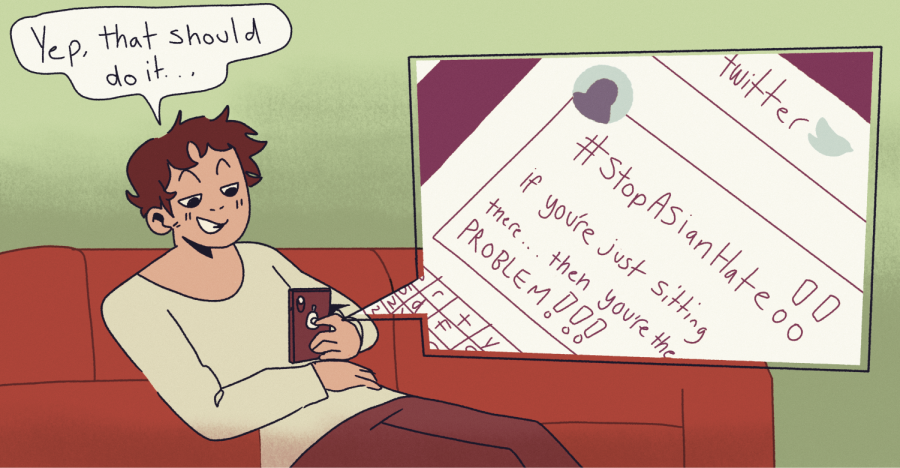Editorial | Anti-Asian violence movements tainted by performative activism
April 27, 2022
Last month marks the first anniversary of the Atlanta spa shootings in which eight people across three Atlanta spas were fatally shot, six of whom were Asian women. The suspect in the shootings, who claims he wanted to “eliminate his temptation” around massage parlors, awaits his trial this fall and seeks to avoid the death penalty.
Though many continue to debate whether the incident should be classified as a hate crime or not, it is nearly impossible to deny that there were underlying racist motivations behind the shootings.
As we look back and honor the victims of this horrific incident, it is important to recognize the significant rise in anti-Asian violence since the beginning of the pandemic. Nearly 11,000 hate incidents have occurred against Asian American and Pacific Islander individuals from March 2020 to December 2021 according to Stop AAPI Hate, a nonprofit organization that records documented instances of violence.
At the beginning of the pandemic, many organizations such as Stop AAPI Hate took to social media to bring awareness to this increase in violence against Asian Americans, which was barely covered by traditional media outlets. This anti-Asian hate movement, labeled with #StopAsianHate, peaked on social media immediately following the Atlanta spa shootings.
And as the pandemic is coming to an end, it seems that the social media movements have halted as well. However, the violence against Asian Americans has not.
Get The Daily Illini in your inbox!
This past February, a man attacked seven Asian American women on the streets of Manhattan, injuring six and leaving the other unconscious. Two weeks prior, an Asian American woman in New York City was followed to her apartment and stabbed to death.
There was little to no coverage of these incidents, which highlights how performative the movement was overall.
Although #StopAsianHate began with good intentions to spread awareness, the movement ultimately fell far from the mark.
On one hand, the hashtag was a cesspool of traumatizing videos of violence against Asian Americans without content warnings. This served to help no one — it merely amplified the fear felt by Asian Americans that were subjected to seeing this violence on their feed and dehumanized the victims of these harrowing instances.
On the other, equally unhelpful hand, many social media “activists” simply reposted #StopAsianHate on their Instagram stories — which sometimes contained just the hashtag and offered no additional resources — and might as well have been the equivalent of screaming into the void.
This is not to say that social media activism has no redeeming qualities. Instagram is a great way to donate to local charities, find other people within your community for support and educate others.
But ultimately, social media movements end up being shallow and provide little help to communities that are in need. Venture outside of social media — take a class on the history of anti-Asian violence at the University or volunteer at the Asian American Cultural Center.
Look beyond the infographics — start looking for active ways to support Asian American communities around you.







